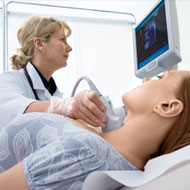- General Articles
- General Pregnancy Questions
- Baby Growth
- Pregnancy Diet
- Miscarriage
- During Pregnancy
- Twin Pregnancy
- Toddler Meals
- Home Remedies During Pregnancy
- Breastfeeding
- Pregnancy Week By Week
- Pregnancy Tests
- Ectopic Pregnancy
- Pregnancy Signs and Symptoms
- Pregnancy Stages
- Potty Training
- Fetal Development
- Preschooler
- Postpartum Depression
- Toddler Illness
- Baby Care
- After Pregnancy
- Molar Pregnancy
- During Delivery
- Beauty and Style
- Pregnancy Clothing
- Preconception
- Fertility
Postpartum Thyroiditis
Thyroiditis is the medical term used to refer to an inflammation of the thyroid gland. It may be either a painful or a painless condition depending on the underlying cause. Postpartum thyroiditis is a painless inflammation of the thyroid gland that occurs in women after they have given birth.
What Is It?
The thyroid gland plays an important role in a woman’s fertility cycle. Maintaining the levels of thyroid hormones in the body helps reduce the risk of any thyroid complications after delivery.
Postpartum thyroiditis is one of many such complications that occur in women after childbirth. This condition is characterized by an inflammation of the thyroid gland and its cause is not known.
Postpartum thyroiditis is a condition where the thyroid gland initially becomes overactive, a phase known as hyperthyroidism. This is followed by a phase where the thyroid gland becomes underactive, a phase known as hypothyroidism. Both these phases are usually temporary.
Postpartum thyroiditis is quite common. Statistics compiled by the American Thyroid Association (ATA) reveal that it affects approximately 5% to 10% of all women after delivery.
While the exact causes of postpartum thyroiditis remain unknown, studies have shown that certain factors are associated with an increased risk of developing the condition. These risk factors include:
- Women who have a history of thyroid disorders
- Women with type 1 diabetes
- Women with a history of postpartum thyroiditis after previous deliveries
- Women who have anti-thyroid antibodies in their blood, such as antibodies developed by the body in response to an injury
Symptoms of Postpartum Thyroiditis:
The symptoms of postpartum thyroiditis will depend on the phase of the condition.
In the first stage of hyperthyroidism, the inflamed and hyperactive thyroid gland secretes increased amounts of thyroid hormones into the bloodstream. Symptoms may be completely absent during this stage but may include:
- A feeling of warmth
- Muscular weakness
- Mild tremors
- A feeling of anxiety
- Rapid heartbeat or palpitations
- Loss of concentration
- Unexplained weight loss
In many cases, these symptoms do not last long and usually subside. In other cases however, the thyroid gland may get damaged leading to a depletion in the reserves of thyroid hormones. This results in the next phase of postpartum thyroiditis, hypothyroidism, characterized by an underactive thyroid gland.
Symptoms during this phase of hypothyroidism include:
- Feeling tired and weak
- Inability to bear cold weather
- Loss of memory
- Constipation
- Unexplained weight gain
While these symptoms may also clear up on their own, there is a danger of further damage being caused to the thyroid gland along with other complications.
The symptoms of postpartum thyroiditis may not appear for several months after the birth of the child. Diagnosis is made difficult by the fact that the early symptoms can be mistaken for the normal signs of recovery from childbirth. For this reason it is essential to consult a doctor at the first onset of symptoms. Regular post-natal visits to your doctor can help in the early diagnosis of this condition.
Diagnostic tests for postpartum thyroiditis will depend on the phase of the disease. For symptoms of hyperthyroidism, your doctor may require a radioactive iodine uptake test. This will help your doctor to distinguish between postpartum thyroiditis and Graves’ disease, both of which can cause hyperthyroidism.
Treatment for Postpartum Thyroiditis
In a majority of cases, thyroid function returns to normal after a period of time. However, some women who develop postpartum thyroiditis will eventually develop hypothyroidism, a condition that requires thyroid replacement therapy. Since the condition of hypothyroidism poses a high risk to developing fetuses, mothers with this condition will have to get their thyroid hormone levels under control before attempting to conceive.
The course of treatment for postpartum thyroiditis will be decided by your doctor based on certain factors. These include:
- Your age
- Your medical history and overall health
- The stage of your disease and its degree of severity
- Your ability to tolerate certain medications and procedures
- Your personal preferences
- The doctor’s expectations regarding the course of the disease
The treatment decided upon will depend to a large extent on the phase of the disease and the severity of symptoms that you are experiencing. The ATA recommends ongoing thyroid monitoring as an integral part of any therapy, since almost 80% of women diagnosed with postpartum thyroiditis experience normal thyroid functioning within 18 months of the onset of symptoms.
Read more articles from the After Pregnancy Category.



 7 Must-Haves Before Your Baby Arrives
7 Must-Haves Before Your Baby Arrives Bonding Games for Babies
Bonding Games for Babies DIY Baby Bath Towel Apron
DIY Baby Bath Towel Apron Common Late Pregnancy Fears
Common Late Pregnancy Fears